Best Business Security Systems
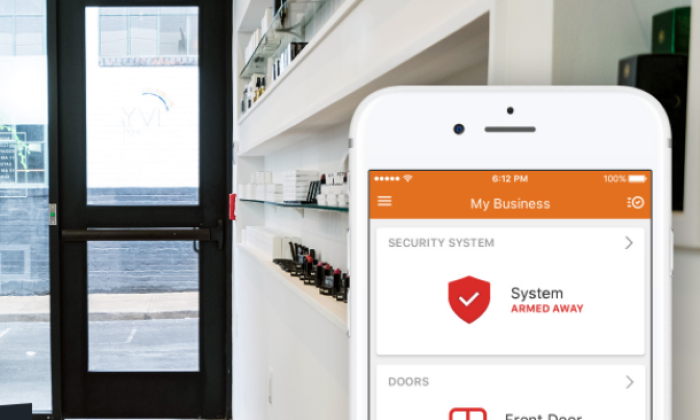
Disclosure: This content is reader-supported, which means if you click on some of our links that we may earn a commission.
It’s a good idea to set up a business security system before you need it.
For too many companies, the decision to make this investment is reactive. Their company’s physical security gets compromised, resources are lost, and employees feel unsafe.
A lot of people see cost as a barrier to installing a reliable business security system. That used to be true, but today, there are tons of really affordable solutions.
A small shop can set up basic video surveillance for under $300 for the first year. No joke. And the high-end systems cost nothing compared to the losses they prevent.
Don’t want to drill holes and run wires? That’s fine. There are DIY wireless systems available for a song.
And, with video storage in the cloud, most business owners can monitor all their alerts and recordings from a smartphone.
I’ve put together a list of five of the best business security systems. You’ll find lightweight options that cover the basics, as well as powerful systems with competitive pricing.
In here, there’s going to be a business security system that meets your specific needs. By the end of this post, you’ll know which one.
The Top 5 Options for Business Security Systems
- SimpliSafe – Best for DIY Security System for SMBs
- Vivint – Best for Professional Monitoring
- Alarm.com – Best Professional Security System for SMBs
- Alibi Security – Best for Upgrading Existing Security Systems
- Wyze – Best for Affordable DIY Video Surveillance
How to Choose the Best Business Security Systems for You
Pretend you are a thief. Could you break into your own business and get away with it?
Without a full business security system in place, every office or storefront is going to look like an opportunity to the wrong crowd.
But what does it take to really secure a space?
Not that much, unless you’re trying to lock down a casino or bank.
The typical workplace and even huge corporate headquarters can get by with a surprisingly modest amount of equipment.
Let’s break business security systems down into their basic elements:
- Access control
- Intrusion detection
- Video surveillance and recording
- Professional monitoring
- Installation
I’ll go over the major considerations in each section. From there, you can decide which equipment is going to work best in your space.
Access Control
One of the key responsibilities for a business security system is controlling access to the property. The products I really like have smart locks, which can be controlled remotely.
What’s more fun than having to let someone into the office on your day off?
Plus these locks can be set to open or shut at particular times, ensuring that a building is secure even if the last person out forgets.
Many smart locks come with keypads and let you assign unique PIN codes that identify who is entering. No more missing keys.
Some of the more advanced access control features include keycard systems, which create a log of everyone coming and going.
Intrusion Detection
Adding sensors to doors and windows lets business owners know when something has been opened.
Usually, owners can configure the types of alerts they get. This means a manager might get an alert that a service door was left ajar, but only the owner would see that the safe was opened.
There are also motion sensors, which can trigger alerts or blare a warning siren to let an intruder know they’ve been detected.
Glass break sensors are triggered by the specific frequency of someone smashing a window, which can provide an alert even when a burglar is not in view or range of other equipment.
Some cameras come with built-in motion detectors, alarms, lights, and sirens. Mounting one of these cameras over an entrance can deter would-be criminals, especially if they trip the motion detector and find themselves bathed in light, frowning at a camera.
There’s actually quite a bit these cameras can do, so let’s jump to that now.
Video Surveillance & Storage
Each camera that is part of a business security system has two important jobs: capture video and store it safely.
To accomplish both these tasks, a camera has to have the right capabilities. Let’s break down each responsibility.
In terms of capturing footage, here are the core camera features to be thinking about:
- Resolution: the quality of the picture (look for 1080p or better)
- Field of view: how wide an angle the camera sees
- Pan: the range a camera can swivel from side to side
- Tilt: the range a camera can swivel up and down
- Zoom: the camera can reframe and enlarge part of the field of view
- Infrared: the camera can use heat signatures to improve lowlight/night vision.
Let’s say there’s one camera pointed straight down a hallway, and another in a parking lot. The hall cam doesn’t need a wide field of view, night vision, or the ability to pan/tilt/zoom.
The parking lot cam might need all those features, plus a higher resolution to keep image quality when zooming in on a car at the end of the property.
Now, surveillance footage is pretty much useless if you can’t access it when needed. In terms of video storage, here are some of the major things to think about:
- Camera type: analog, cellular, IP, and WiFi cams
- Resolution: the higher the image quality, the more storage required
- Clip capture: whether a camera records a picture every x seconds or records for y seconds after motion is detected
- Continuous recording: the camera is rolling 24/7
- Storage location: recordings can be stored on a video card, in the cloud, on a DVR, NVR, or some blend of these locations.
The overarching question is, how do I make sure that every camera can deliver its recordings to a centralized place where everything can be managed?
With cellular and WiFi cameras, you really just have to get power to them. WiFi cameras have to be in range, but cellular ones can be anywhere service is available. If these are battery-powered and record to a memory card, they are 100% wire-free solutions.
When it comes to IP and analog cameras, they have to connect to a recorder. If the cameras are PoE (power over ethernet), power and recording can be delivered with the same wire. If not, you’ll need to both power the camera and wire it to the central hub.
Professional Monitoring
Some business security systems have the option to include professional monitoring. That means that emergency alerts will be routed to a security center who will contact police, fire, and/or EMS.
The cost of professional monitoring can vary widely and sometimes it is only available via a third-party service.
Installation
Some vendors offer installation for supposedly DIY systems and I recommend pricing that out. If it takes you and one other person all day to set things up, is that really more economical than paying a pro $100 to get it right before lunch?
With the more heavy-duty systems, professional installation is going to be required. Getting dozens of IP cameras wired and placed throughout a large property is not something a non-specialist should tackle.
There are also codes and regulations to consider for the non-DIY systems. Usually a sales rep will be able to answer all your questions about fire code and other laws that might affect your system.
It’s nothing to lose sleep over, just not a problem you want to discover with the inspector.
The Different Types of Business Security Systems
The breakdown of different types of business security systems is pretty straightforward. Depending on your needs, you may know exactly what type is going to work.
Alternatively, you may fall somewhere in between these categories. Then the decision will come down to the specific equipment that makes up the system.
If anything, I’d err on the side of caution and make extra sure you are securing the entire property, rather than trying to stretch a lighter system to its limits.
DIY Business Security Systems
The so-called DIY business security systems are made up of WiFi and cellular cameras that don’t necessarily require any extensive setup.
Since the cameras record directly to the web, there’s no need to wire them to a central recorder. Mostly it’s just mounting the cameras and plugging them in to a power source.
All the cameras, sensors, locks, and other equipment are accessible from a browser or mobile app. If you are not climbing ladders, the whole installation may take no more than an hour.
DIY business security systems are really affordable, but they have their limits. They don’t typically accommodate a large number of cameras and start to lose their effectiveness at longer ranges.
Professional Business Security Systems
When it comes to business security systems that have to be installed by a professional, you’re going to get a much greater range of capabilities than with a DIY system.
For one thing, you will be able to deploy a large and complex system. This means as many cameras, sensors, and locks as necessary. All of it will be centralized in one place, regardless of the type of camera.
They’ll also have more robust access control equipment that’s designed specifically for businesses, like keycard systems.
The cameras tend to be more expensive than their DIY counterparts, but they capture better quality images, have greater range of vision, and include enhanced night vision or other capabilities.
If you think that a DIY system won’t cut it but you’re not sure you need a commercial-grade security solution, this category is going to cater to your needs.
Commercial-Grade Business Security Systems
The biggest difference between commercial-grade and professional security systems is the range and depth of the equipment available. These are solutions that work for casinos, airports, correctional facilities, and so on.
We’re talking thermal cameras that can record body temperature so that workers clocking in can be alerted if they have a fever. They’ll be able to recognize faces and license plates, quantify foot traffic, and come in virtually indestructible casings.
They also tend to offer a much richer system to manage video surveillance at scale. Hundreds or thousands of cameras can be linked to a unified system that uses analytics to surface the most critical alerts.
Not every business needs a commercial grade solution, but those that do shouldn’t settle for anything less.
#1 – SimpliSafe — Best DIY Security System for SMB
SimpliSafe is one of the most popular security systems for home and business. Why? The equipment is easy to install and gets the job done.
SimpliSafe’s hardware is basically plug and play, with the entire system controlled from its mobile app. From the base station, which is the core of the system, it’s possible to build out a fairly extensive system with their range of sensors and multipurpose SimpliCam ($99 indoor, $119 outdoor).

Because these cameras have cellular and WiFi connection, they only need power to start working right away. This cuts down on setup hassles and gives more flexibility in terms of how far you can place cameras from the base station.
From the app, you can arm/disarm your system remotely. You can also create unique PIN codes so you know who exactly is accessing the building. Create one code for cleaners, one code for each employee, and grant or deny access without ever having to come in.
A lot of SMBs lease space that someone else is responsible for. When the landline goes down or there is a power outage, they can rely on SimpliSafe’s cellular cams with battery backup to maintain security.
Some of the highlights of a SimpliSafe business security system include:
- HD video/audio cameras
- Smart locks
- Sensors for entry, motion, glass break, temperature, and water
- 105dB siren (about as loud as a car horn)
- Smoke and carbon monoxide detectors
- Centralized dashboard for multi-site management
- 24/7 alerts
I really like it for SMBs because the setup is truly DIY and covers all the bases of business security. They have dedicated business packages for offices, storefronts, and restaurants which come with tools designed to meet the challenges of each space.
Plus, the professional monitoring services are really affordable. It’s 50¢/day for Standard and 83¢/day for Interactive, which comes with a lot more features.
With either plan, when an alarm is tripped, SimpliSafe confirms with video verification that the threat is real before dispatching police.
They also provide assistance with the permitting process for security systems, which takes another responsibility off the plate of SMBs located in cities or states with important regulations.
There are no contracts with SimpliSafe and you can cancel any time. On top of the extremely competitive price, SimpliSafe offers free shipping, free returns, and a 60-day money-back guarantee. They’ll even pay the return shipping.
That gives you basically two months to figure out if SimpliSafe works in practice. And if it doesn’t, don’t pay.
#2 – Vivint — Best for Professional Monitoring
Vivint is a great professional business security system. For companies that can’t use a DIY solution, but they also don’t need the hefty services associated with commercial-grade security, Vivint strikes the right balance.
They have a wide range of equipment and 24/7 professional monitoring comes with every plan they offer.
Vivint doesn’t outsource monitoring to a third-party service. Since it’s kept in-house, the average wait time for an emergency is eight seconds. That’s 7.5 times faster than the national average.
Cellular connection with battery backup will keep the system operational during a power outage, so the 24/7 professional monitoring remains unbroken.
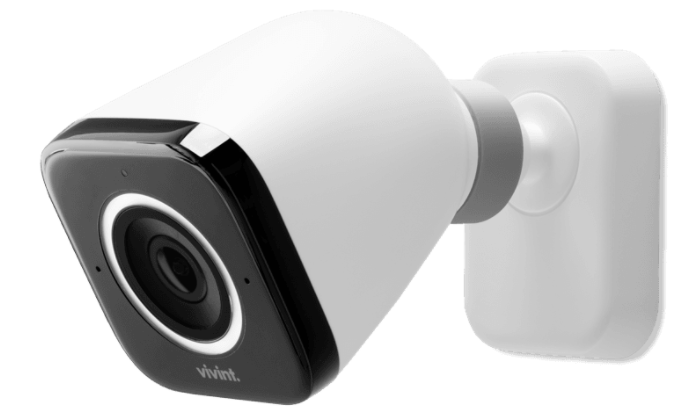
There are three motion-activated cameras that Vivint offers, all of which deliver real-time alerts to you and the Vivint security team.
My favorite, the Outdoor Camera Pro, comes with Smart Sentry detection, which recognizes human movement. It lets off a loud chirping noise that draws the intruder’s eyes up to the camera where a red recording light lets them know you’re on camera.
With the two-way voice feature, you can hear what’s happening and deliver your own choice words about the attempted intrusion.
Vivint’s outdoor camera also captures really high-quality images. With the 4k image sensor, it’s possible to zoom in on faces and license places, even in the dark.
Every camera Vivint makes is just as feature-rich as their outdoor cam, and I didn’t even cover everything that comes with it. Their other business security features are similarly robust, including:
- Wireless security cams
- Pan and tilt cams
- Doorbell cams
- Door and window sensors
- Sensors: Door and window, recessed door, motion, tilt, glass break, temperature, and flood
- Smoke and carbon monoxide detectors
- Medical pendants
- Smart locks
- Smart thermostats
The Vivint Smart Drive stores all captured video, automatically creating clips whenever sensors detect unusual activity. Everything stored can be viewed, managed, and controlled on the mobile app.
The Smart Drive automatically stores 30 days of continuous footage. This is nice because businesses don’t always know something has happened immediately, even with professional monitoring.
If someone is playing funny money with the register, being able to look back and zoom in on the cash drawer can be crucial.
You can call Vivint to get a price for how much a business security system is going to cost. Be advised, the equipment is fairly expensive.
The Outdoor Camera Pro is $399.99 purchased alone, but they offer zero-interest payment plans broken down over the course of years to help keep the monthly payment competitive.
All Vivint equipment comes with a lifetime warranty and strong encryption to prevent footage from being accessed by unauthorized users.
There’s just a lot of peace of mind you get with Vivint, because you know they are always there if something happens.
#3 – Alarm.com — Best Professional Business Security System for SMBs
Alarm.com is famous for both its home and business security systems. Their technology is used to protect more than 5 million properties and they have an A+ rating from the Better Business Bureau.
For business, they are focused on serving small to mid-market business owners. This means they don’t have the same range of products as commercial-grade solutions, but what they do offer is tailor-made for the challenges SMBs face every day.
Their Smarter Business Security centralizes all security cameras, lights, and locks for easy automation and control. Information that the devices capture is reported on clear dashboards from the website or mobile app.
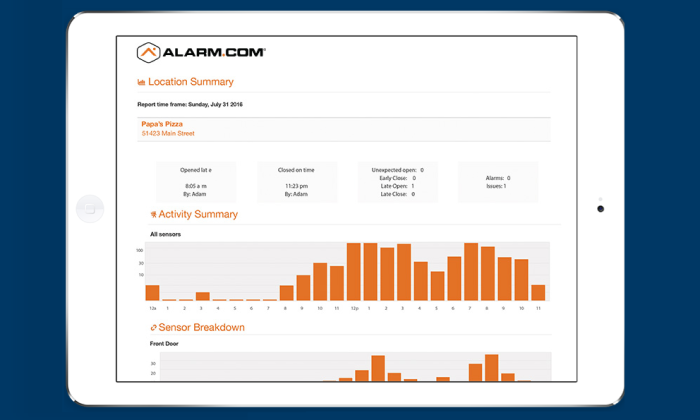
You can set schedules to automatically lock doors at a certain time each day of the week as an extra safeguard. If there is an intrusion detected, real-time viewing allows owners to see if the disturbance warrants calling the police.
Alarm.com can be deployed across multiple sites, where the reporting features can be really helpful in ways beyond business security.
For one, you can visualize trends, identifying rush times and customer traffic.
And since the lights and the thermostat are connected to the alarm system, the building will always be comfortable when people are there and energy-efficient when they’re not. Alerts prevent a window from not being shut all the way, which limits waste and eliminates a potential security breach.
In terms of cameras and equipment, Alarm.com offers:
- Indoor/outdoor cameras
- Wired/wireless cameras
- Fixed/Pan cameras
- Smart locks
- Keycard systems
- Entry sensors
Analog cameras can be connected to your Alarm.com system and every camera they sell comes with anytime mobile access, instant video alerts, intelligent clip capture, and real-time streaming.
To purchase an Alarm.com business security system, you’ll have to reach out to an authorized service provider in your area. Depending on your needs and requirements, all of their providers offer a range of self-service and professional installation options.
Alarm.com is a step above the full DIY systems. It unifies intrusion detection, access control, video surveillance, and energy management into a single, intuitive app.
Business owners are always informed and their property is always safe.
#4 – Alibi Security — Best for Upgrading Existing Security Systems
Alibi Security is an umbrella company that sells equipment from a number of high-end security brands. Because of this, they offer an incredibly wide range of devices that can tie into any system.
It’s a great commercial-grade option for companies that want to upgrade instead of replace their existing infrastructure. No matter how you have deployed your system in the past, Alibi has the tools to help you improve it.
There’s just a stunning range of top-of-the-line equipment that can be adapted to fit any scenario. Just looking at security cameras, for instance, Alibi has:
- Cloud IP cameras
- HD-TVI Cameras
- Network IP cameras
- Wireless cameras
- Pan-tilt-zoom cameras
- Doorbell cameras
- Deterrent cameras
- Hidden cameras
- Micro cameras
- Board cameras
- Snake cameras
What does a hidden camera look like? Alibi has some that look like ceiling speakers, motion sensors, and even smoke detectors.
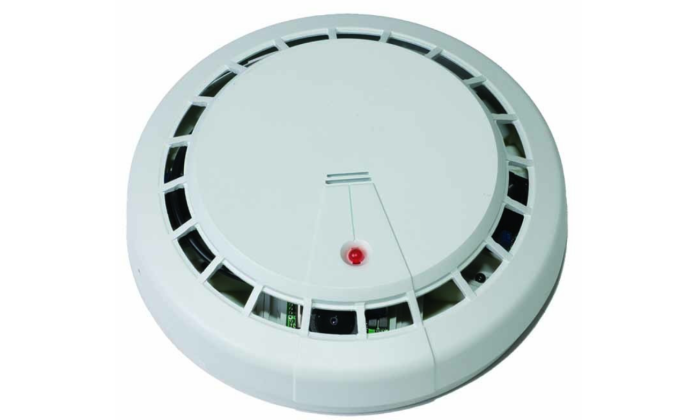
They have the video recording solutions to completely support any array of cameras—analog, IP, wireless… it doesn’t matter. All Alibi recorders have common management software, centralizing operations and decreasing the learning curve for users.
When it comes to intrusion detection and access control, Alibi has a full set of hardware and software to set up keypad, keycard, and request-to-exit systems.
Much of Alibi’s equipment is compliant with the National Defense Authorization Act, which means it’s good enough for the U.S. Military.
You’ll have to get in touch with a licensed Alibi dealer in order to get pricing. It’s going to be on the high end, like other commercial-grade security solutions tend to be.
Where it stands out from its direct competitors is the ease with which Alibi’s equipment integrates with your existing hardware. Since all of their HD/TVI recorders have Hybrid+ technology, it’s not hard to migrate from analog to HD or to install a hybrid analog/HD solution.
Adding more cameras is also easy, as many Alibi recorders support up to 64 IP channels that are each pre-licensed and fully-enabled.
Easy to tie in and easy to scale out, Alibi is the choice for companies looking to beef up their security with the latest and greatest technology.
#5 – Wyze — Best For Affordable DIY Video Surveillance
Wyze has ridiculously low priced cameras that get the job done for businesses that need to record what happens onsite.
Really, Wyze is aimed at homeowners more than business, but if all you need is video surveillance, what’s the difference?
The latest version of the Wyze Cam is $19.99. It’s small, yet it’s got 1080p color night vision and IP65 weather resistance. The Wyze Outdoor Starter Bundle ($49.99), which comes with one outdoor cam and a required base station, lets you mount a cam anywhere.
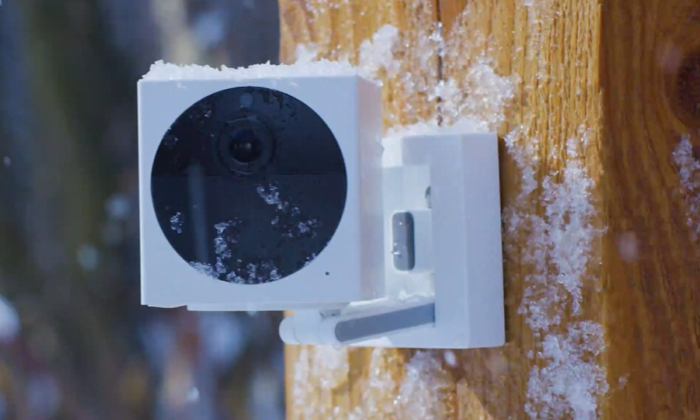
Really, anywhere. The outdoor cam is wire-free and powered by batteries that last 3-6 months. With Wyze, there’s a lot of freedom to get a video surveillance system set up at very little cost.
The Wyze Cam Pan ($29.99) can spin 360° in under three seconds. It also has motion detection so it can follow the action. This is essentially at one-third to one-tenth the cost of most other cameras that can pan.
Some of the Wyze smart home products are really helpful for business owners. Wyze Bulbs, for instance, connect to WiFi to give you the ability to control them at once or individually.
Change the light color temperature to better suit the mood of a restaurant—soft and warm for the diners and then bright as day for the nighttime clean up crew. Set a schedule so lights come on during the night to make would-be intruders think someone is there.
Some of the other nice products and camera capabilities include:
- Doorbell camera/intercom
- Smart thermostats
- Smart locks
- Motion detection sirens
- Motion detection zones
- Mobile app
- Smoke and carbon monoxide alerts
Beyond the motion detection siren on the Wyze Cam, they don’t have any products for intrusion detection, though a new line of Wyze Sense products is on the horizon.
In terms of access control, they offer the smart lock ($99) and keypad ($20) that fits over most single-cylinder deadbolts. It will give you a record of everyone who keys in and out and alert you if the door is open.
For video storage, the Basic plan is free and comes with 14-day rolling cloud storage, though it only captures a 12-second video when it detects motion or sound. There’s also a five-minute cooldown period before you can see the video.
My guess is that a lot of business owners are going to want the CamPlus plan ($1.25/month per camera). It’s a very competitive price and comes with unlimited video length recordings and no cooldown period.
At the end of the day, several Wyze cameras are going to deliver 1080p video surveillance for well under $300 in the first year, including the cost of the equipment.
Summary
Some tasks are really hard to define. Securing a business is not one of them.
The goals are clear and the stakes are high. Offices, shops, restaurants, and warehouses are responsible for keeping their shared space safe.
It’s not just about protecting assets. A business’ reputation with staff and customers are on the line.
For SMBs that want a security system they can set up themselves, SimpliSafe is a really great option. It’s got the full range of intrusion detection, access control, and video surveillance necessary, yet the system remains easy to deploy and manage.
If you only need video surveillance, the best DIY option is definitely Wyze. The price is impossible to beat and the cameras are surprisingly good.
Should DIY security systems not rise to the challenge, Alarm.com can outfit a business completely. Whether they protect one or many sites, owners get total oversight of their business security in the sleek interface.
Vivint is an excellent choice for businesses that need professional monitoring. Their equipment is really solid and their security team will verify the incident over video before alerting the authorities. Cutting down on false alarms is huge for ensuring a quick, reliable response.
Looking at commercial-grade solutions, Alibi Security is a really strong choice. Not only do they offer best-in-class security solutions, they’ll integrate seamlessly with your existing stack. For businesses that want to evolve their security in the right direction, Alibi is it.
The post Best Business Security Systems appeared first on Neil Patel.
from Neil Patel https://ift.tt/3mQDSqp
No comments